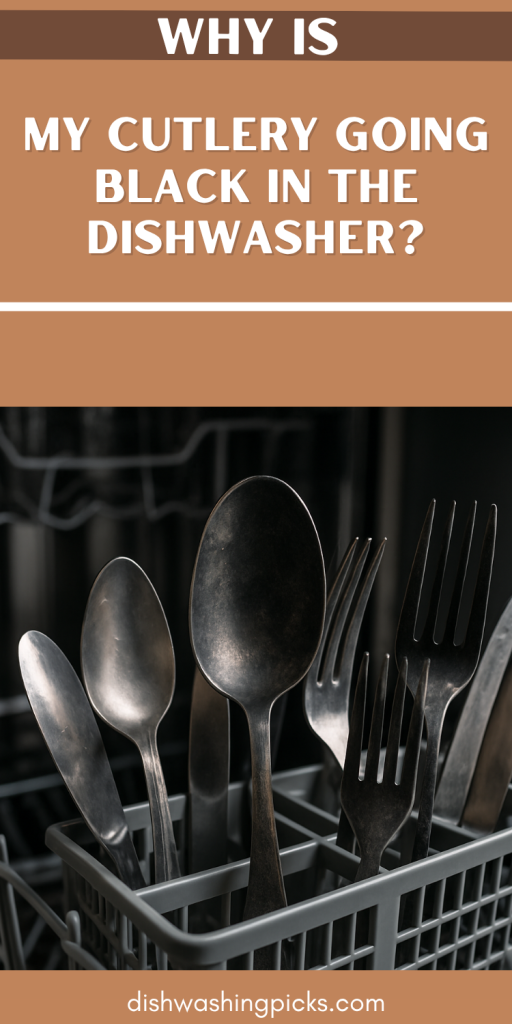
Okay, let’s talk about something that’s probably left you standing in your kitchen holding a fork like it’s been dipped in motor oil. Ever pulled your cutlery out of the dishwasher and thought, “Wait… why does this spoon look like it’s aged a hundred years overnight?” Yeah, we’ve all been there.
If your shiny silverware is coming out looking more haunted mansion than sparkling clean, don’t worry. You’re not cursed. Your dishwasher isn’t plotting against you (probably). But there is a reason behind it—and a few super simple things you can do to fix it.
So… What’s With the Black Cutlery?
Let’s cut to the chase (no pun intended): if your knives, forks, or spoons are turning black or tarnished in the dishwasher, there’s usually a culprit—or a few of them—hiding in plain sight.
First up: chemical reactions. Sounds fancy, right? But basically, your dishwasher is a little chemical war zone during a wash cycle. High heat, water, detergent, and different metals all bouncing around? Things can happen. Especially to certain types of metal—like silver-plated or cheap stainless steel.
Now imagine this: you throw in a spoon that’s seen better days, mix it with some aluminum cookware, blast it with hot detergent water, and boom—reaction central. That dark coating? It’s oxidation, and your silverware’s not a fan.
Could It Be Your Detergent?
Oh, absolutely. Some dishwasher detergents are a little too… aggressive. The kind with bleach or harsh chemicals? They’ll scrub the soul out of your cutlery.
Especially if your water is “soft” (meaning it doesn’t have much calcium or magnesium in it), the detergent can go a little wild. It ends up corroding the metal instead of just cleaning it. The result? Dingy, dull, black-streaked utensils that look like they’ve been through a thunderstorm.
Pro tip: Try switching to a gentler, phosphate-free detergent. Sometimes even a simple change like that can make a big difference.
What About Mixing Metals?
Here’s a fun fact (well, not-so-fun if it’s ruining your forks): mixing metals in the dishwasher can cause galvanic corrosion. Sounds like something out of a sci-fi movie, but it’s real. Basically, different types of metal—like stainless steel and silver or aluminum—can “react” with each other in the high-heat, wet environment of a dishwasher.
This leads to—you guessed it—tarnish, discoloration, and that black residue that’s driving you nuts.
Try thinking of it this way: your dishwasher is like a middle school cafeteria. If you force all the kids (aka metals) to sit together, there’s bound to be some drama.
Are You Loading It Wrong?
Now, don’t take this personally… but maybe it’s not the dishwasher’s fault. Maybe it’s how you’re loading it?
If you’re cramming too many utensils together or placing silver items next to stainless steel ones, you’re kind of inviting trouble. Not only can they rub against each other (causing scratches and wear), but remember that metal-on-metal issue we just talked about? Yep. This is where it happens.
Give your cutlery some space. Let them breathe. Keep the silver separate from the rest if you can. Trust me, they’ll thank you for it. (Well, if cutlery had feelings.)
What’s the Water Got to Do with It?
A lot, actually. Your water type—whether it’s hard or soft—can totally change how your dishwasher behaves.
Hard water (loaded with minerals like calcium and magnesium) can leave cloudy deposits and dullness on cutlery. Soft water, on the other hand, can make detergents a bit too effective, stripping away protective layers on your metal utensils.
Either way, if your dishwasher isn’t rinsing properly—or if it hasn’t been cleaned in a while—those leftover minerals or detergent residues can build up, leading to discoloration over time.
Quick fix? Run a dishwasher cleaner once a month. Add a rinse aid if you’re not already using one. And if you’re feeling fancy, test your water hardness and adjust your detergent amount accordingly.
Alright, So How Do I Fix It?
You want answers? We’ve got you. Here’s your battle plan:
- Stop mixing metals: Keep silver, aluminum, and stainless steel separate.
- Use gentle detergent: Go for something eco-friendly or phosphate-free.
- Check your rinse aid: It helps prevent buildup and streaks.
- Clean the machine: If your dishwasher is grimy, your dishes will be too.
- Load smart: Don’t let utensils clank together—especially not across metal types.
If your cutlery’s already gone to the dark side, try soaking it in a mixture of baking soda and warm water, or give it a gentle scrub with a paste made of baking soda and vinegar. Just don’t go overboard with anything abrasive.
Final Thoughts (And a Little Dishwasher Love)
Look, dishwashers are magical little boxes that save us from scrubbing spaghetti sauce off plates at 10 p.m.—but they’re not perfect. A few tweaks to your routine can keep your cutlery looking crisp and clean, instead of like it’s been through a dungeon.
So next time you pull out a weirdly black spoon, don’t panic. Now you know what’s going on—and how to fix it.
And hey, if you’re still not convinced your dishwasher isn’t plotting against your silverware… maybe it’s time to hand-wash those fancier pieces. Just in case.
Want to keep your dishwasher drama-free? Stick around—we’ve got more cleaning tips coming soon that’ll make your kitchen sparkle (with way less mystery). 🧽✨
